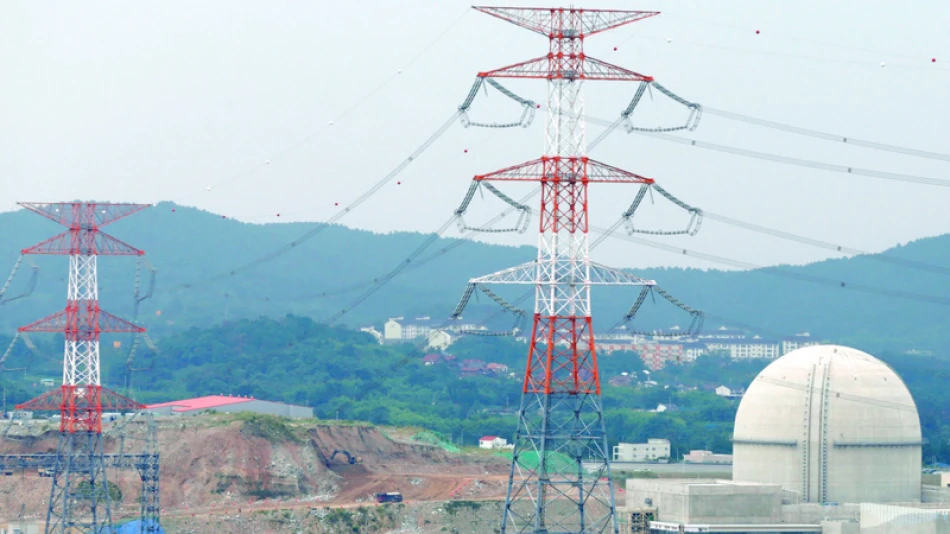
South Korea Pursues Balanced Energy Transition to Secure Sustainable Future
South Korea's Energy Awakening: How Geopolitical Chaos is Forcing Seoul to Rethink Everything
South Korea finds itself dangerously exposed in an era where energy has become the ultimate geopolitical weapon. With over 60% of its crude oil imports coming from distant partners and critical dependence on China for essential battery minerals, Seoul is scrambling to redesign its entire energy strategy. The stakes couldn't be higher: as AI-driven electricity demand surges 11% annually and global supply chains fragment, South Korea's economic future hinges on whether it can successfully balance energy security, affordability, and sustainability in record time.
The New Reality: Energy as Warfare
Recent years have fundamentally altered global energy dynamics, transforming resources from mere commodities into strategic weapons. Russia leverages its natural gas exports as political tools, while China has established near-monopolistic control over critical minerals essential for batteries and renewable energy production—from lithium to rare earth elements.
This weaponization of energy resources has exposed South Korea's vulnerabilities with stark clarity. The nation's heavy reliance on distant oil suppliers and Chinese mineral imports represents a critical national security risk that policymakers can no longer ignore.
Lagging Behind in the Clean Energy Race
South Korea's renewable energy sector tells a troubling story. In 2024, renewables provided just 10.5% of total energy—significantly below OECD averages. This underperformance becomes more concerning when compared to aggressive renewable targets set by competitors: the EU aims for 42.5% renewable energy by 2030, while China plans 1,200 gigawatts of renewable capacity by the same year.
The AI Revolution Complicates Everything
South Korea faces a perfect storm of rising energy demand just as supply security deteriorates. The explosion of data centers and AI infrastructure is driving electricity consumption up by 11% annually through 2028—a trend mirrored in the United States, where total energy consumption is expected to increase by over 25% by 2030.
This surge in demand amplifies pressure for reliable, low-carbon energy sources precisely when traditional supply chains are under assault. For South Korea's tech-heavy economy, energy shortages could prove catastrophic for its semiconductor and electronics industries that power global supply chains.
Global Powers Chart New Courses
While South Korea grapples with its energy vulnerabilities, major powers are implementing comprehensive strategies to secure their energy futures.
United States: Nuclear Renaissance and Allied Supply Chains
The U.S. has declared a national energy emergency, targeting 400 gigawatts of nuclear power while strengthening supply chains among allied nations. This represents a dramatic shift from decades of nuclear stagnation and signals America's recognition that energy security equals national security.
China: Dominating the Clean Energy Transition
China's comprehensive energy legislation sets ambitious targets: 1,200 gigawatts of renewable energy by 2030 and 200 gigawatts of nuclear power by 2040. More importantly, China continues consolidating its dominance over global supply chains for critical minerals and clean energy components—a strategic advantage that could prove decisive.
Europe: Breaking Russian Dependence
The EU is systematically eliminating Russian gas dependence while aggressively scaling renewable sources and reinvesting in nuclear power. This represents the most dramatic energy transformation in European history, driven by the harsh lessons of the Ukraine conflict.
South Korea's Strategic Response: The Three-Factor Framework
Seoul's emerging energy strategy centers on balancing three critical factors: security, affordability, and sustainability. This approach recognizes that isolated solutions—whether purely renewable, nuclear, or fossil fuel-based—cannot address South Korea's complex energy challenges.
Diversification and De-risking
South Korea's new "de-risking" policy aims to reduce Chinese dependence while securing at least 120 days of strategic reserves. The strategy involves diversifying energy imports from the United States, Australia, and Southeast Asia—a move that mirrors similar efforts by Japan and European nations.
Domestic Innovation Push
The government is accelerating domestic research and development in renewable energy, batteries, and smart grids. This represents a fundamental shift from South Korea's traditional reliance on imported technology and resources toward building indigenous capabilities.
Major investments target modern microgrids, battery sector development, and what officials term "energy highways"—infrastructure designed to efficiently distribute power from diverse sources across the country.
Market Implications: Winners and Losers
South Korea's energy transformation will create clear winners and losers in global markets. Korean battery manufacturers like LG Energy Solution and Samsung SDI stand to benefit from increased domestic support and reduced Chinese competition. Traditional energy importers may face pressure as Seoul diversifies suppliers.
For investors, South Korea's energy pivot represents both opportunity and risk. Companies aligned with the country's diversification strategy—particularly those in nuclear, renewable, and energy storage sectors—could see significant growth. However, firms overly dependent on Chinese supply chains may face mounting challenges.
The Broader Implications
South Korea's energy transformation reflects a broader global trend toward energy nationalism and supply chain resilience. The COVID-19 pandemic, combined with protectionist trade policies like the EU's Carbon Border Adjustment Mechanism and America's Inflation Reduction Act, has fundamentally altered how nations approach energy security.
This shift from efficiency-focused globalization toward resilience-centered regionalization will likely accelerate, with energy security becoming the primary driver of international partnerships and trade relationships. For South Korea, success in this transformation isn't just about energy—it's about maintaining its position as a global economic powerhouse in an increasingly fragmented world.
Most Viewed News

 Sara Khaled
Sara Khaled






